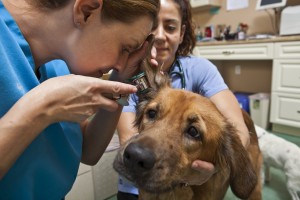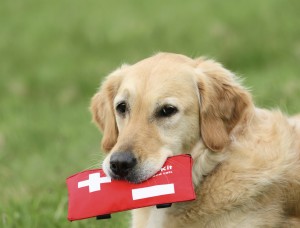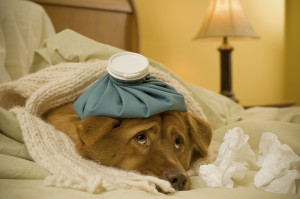Oakland Veterinary Referral Services Blog
The Tick Boom and Your Pet
 Ticks have been an increasing problem for people and their pets over the past few years. According to the Michigan Department of Health and Human Services, reported cases of Lyme disease have almost doubled in two years, with the western region of the state seeing the highest number of incidents. And, while the tick boom has created a worrisome outdoor environment for people, pet owners are also concerned about keeping their pets safe from ticks and the diseases they carry.
Ticks have been an increasing problem for people and their pets over the past few years. According to the Michigan Department of Health and Human Services, reported cases of Lyme disease have almost doubled in two years, with the western region of the state seeing the highest number of incidents. And, while the tick boom has created a worrisome outdoor environment for people, pet owners are also concerned about keeping their pets safe from ticks and the diseases they carry.
Continue…
An Animal Owner’s Guide to Pet Liver Problems
 Liver problems are usually serious for a pet. As a pet owner, you want to better understand what is happening with your pet, even if they know he or she is in good hands. There are many different pet liver problems that dogs and cats can have. Read on to learn what you should know if your pet is having liver issues.
Liver problems are usually serious for a pet. As a pet owner, you want to better understand what is happening with your pet, even if they know he or she is in good hands. There are many different pet liver problems that dogs and cats can have. Read on to learn what you should know if your pet is having liver issues.
Pet Liver Problems: The Rundown
The liver is a very important organ, and pets and people alike need it to stay healthy. The liver has several vital functions including helping in digestion, aiding in proper blood clotting, regulating blood sugar, producing essential proteins, and detoxifying the blood. If the liver isn’t working right, serious problems can develop. Continue…
Beach Safety Tips for Our Lake Loving Canines
 Surf’s up in Michigan! (Ok, well, what we consider surf.) And, many of us, human or animal alike, can appreciate the cool lakeshore on a steamy summer day. Have fun at the beach and avoid these doggie dangers with a little beach safety awareness. High water levels, heat, and pet escape are among some of the possible pet perils.
Surf’s up in Michigan! (Ok, well, what we consider surf.) And, many of us, human or animal alike, can appreciate the cool lakeshore on a steamy summer day. Have fun at the beach and avoid these doggie dangers with a little beach safety awareness. High water levels, heat, and pet escape are among some of the possible pet perils.
To make yours and your pet’s summer extra cool, practice some of the following surf-n-turf precautions. Continue…
How to Handle a Pet Escape Artist
 You turn your back for a minute, and he’s off! A pet escape artist can maneuver through the narrowest of passages, wiggle under any fence, or slip through an open door with the stealth of a ninja – or at least it can seem that way. The truth is, when your pet likes to roam, there’s really no letting your guard down.
You turn your back for a minute, and he’s off! A pet escape artist can maneuver through the narrowest of passages, wiggle under any fence, or slip through an open door with the stealth of a ninja – or at least it can seem that way. The truth is, when your pet likes to roam, there’s really no letting your guard down.
Pets escape for a number of reasons. Getting to the core of what prompts your particular pup or kit to want to wander is a good place to begin.
Understanding the Cause
Dogs and cats are natural roamers. Instinctually, many breeds can travel several miles each day, marking territory, communicating with other animals through scent, and seeking out a mate. However, when it comes to your beloved pet, we discourage the indulgence of these instinctual impulses through training, providing enrichment at home, and spaying or neutering before the first heat. Continue…
On the Forefront: VetCOT and Elevating Veterinary Trauma Care
 Cutting edge veterinary hospitals like Oakland Veterinary Referral Services are joining together to form a national network of veterinary trauma centers. Hospitals in this network will work with the recently formed Veterinary Committee on Trauma (VetCOT) to produce a veterinary trauma registry, standardize trauma practice, and further trauma education. Learn more about why this and other work planned by VetCOT is so important for improving veterinary trauma care.
Cutting edge veterinary hospitals like Oakland Veterinary Referral Services are joining together to form a national network of veterinary trauma centers. Hospitals in this network will work with the recently formed Veterinary Committee on Trauma (VetCOT) to produce a veterinary trauma registry, standardize trauma practice, and further trauma education. Learn more about why this and other work planned by VetCOT is so important for improving veterinary trauma care.
VetCOT
In human healthcare, it is common for hospitals across the nation to work based on the best practices in how patient care is handled. Veterinary hospitals, however, are traditionally privately owned and often work independently. This becomes particularly evident in trauma medicine, where hospitals may be working with dated, or less than optimal, trauma processes and knowledge. Continue…
Adventures in Dog Park Manners
 When you think of taking your four-legged pal to the dog park, do any of the following thoughts come to mind?
When you think of taking your four-legged pal to the dog park, do any of the following thoughts come to mind?
- Oh, great, my dog can play while I catch up on my phone calls, emails, texts…
- Patches has been off the hook lately… think I will take him to the dog park to work off that destructive energy.
- They always have water at dog parks, right?
- Dang, I am in a hurry, but I’m certain they hire someone to clean up doggie messes.
- My dog’s just naturally dominant, like the alpha, and that’s normal.
- Snuggles is just a bit timid; I’m sure she’ll become more assertive in time.
- If you confess to some of these misconceptions, hold the leash!
Veterinary Technician Specialties: Do You Have What It Takes?
 Veterinary medicine is a science-based field, and that means that every day there is more research being done and new findings happening that change the face of what we do. It has gotten to the point that no one person can be an expert in everything related to veterinary medicine.
Veterinary medicine is a science-based field, and that means that every day there is more research being done and new findings happening that change the face of what we do. It has gotten to the point that no one person can be an expert in everything related to veterinary medicine.
In recent decades, veterinarians have trended towards specialization, with board-certified specialists focusing on surgery, oncology, internal medicine, critical care, and other areas of veterinary medicine. The veterinary technician field has followed suit, with the National Association of Veterinary Technicians in America (NAVTA) Continue…
Hot-Weather Pet Safety Quiz
 Hot weather dos and don’ts seem obvious where our pets are concerned. Do make sure there’s plenty of drinking water available. Don’t leave pets in the car. However, many of the activities our pets love, and we don’t worry about, especially away from home, can be riskier than you might think, especially in hot weather.
Hot weather dos and don’ts seem obvious where our pets are concerned. Do make sure there’s plenty of drinking water available. Don’t leave pets in the car. However, many of the activities our pets love, and we don’t worry about, especially away from home, can be riskier than you might think, especially in hot weather.
Try this quiz about hot weather pet safety – the answers (near the end) may surprise you!
Which of these situations may be dangerous (or at least very uncomfortable) for your pet?
(Assume drinking water is freely available.) Continue…
Basic First Aid for Pets
 No one wants to think about a pet falling victim to accident or illness, but most of us will agree that thinking about emergency preparedness is important. The reality is: accidents happen and sudden illness or symptoms of distress can befall any pet, even the healthiest. Because of this, having a basic understanding of how to administer First Aid for pets is an important skill for any pet owner and can even save the life of a pet. Continue…
No one wants to think about a pet falling victim to accident or illness, but most of us will agree that thinking about emergency preparedness is important. The reality is: accidents happen and sudden illness or symptoms of distress can befall any pet, even the healthiest. Because of this, having a basic understanding of how to administer First Aid for pets is an important skill for any pet owner and can even save the life of a pet. Continue…
A Dog Owner’s Guide to Canine Influenza (the Dog Flu)
 The media has been abuzz lately with news of the latest canine influenza outbreak. This disease has been hitting the Chicago area hard over the last month or so, and has many pet owners reeling with questions.
The media has been abuzz lately with news of the latest canine influenza outbreak. This disease has been hitting the Chicago area hard over the last month or so, and has many pet owners reeling with questions.
What is this dog flu? Should I be worried? How do I protect my pet? …Well, look no further for your answers. Continue…


